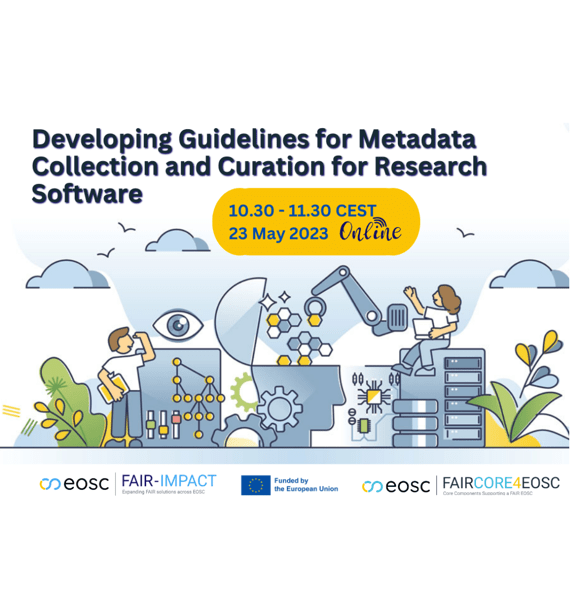FAIR-IMPACT Webinar: Developing Guidelines for Metadata Collection and Curation for Research Software
Home | Events | Project | FAIR-IMPACT | FAIR-IMPACT Webinar: Developing Guidelines for Metadata Collection and Curation for Research Software

Online, 23 May 2023.
The aim of this FAIR-IMPACT webinar is to present a draft of the FAIR-IMPACT guidelines for the collection and curation of metadata to archive, reference, describe and cite research software. During the webinar, taking place from 10:30 – 11:30 CEST, we will request input from participants on a Q&A document and on a shared Google doc. The guidelines were developed by the FAIR-IMPACT “Standard metadata for research software” team, with joint efforts of the other partners in the FAIR-IMPACT project and the FAIRCORE4EOSC project.
Goal of the event
During the webinar, FAIR-IMPACT will show its exploration research software landscape, showcasing different guidelines and metadata vocabularies. FAIR-IMPACT will also address the need for standardised guidelines for collecting and curating metadata for all types of research objects, not only for researchers and developers but also for reviewers/moderators and publishers who handle software in their publication workflow.
The event will survey the ecosystem of scholarly infrastructures and review existing guidelines in this area, integrating feedback from the research community.
The goal of the webinar is to foster coordination and collaboration among various relevant projects and organisations, including the EOSC Task Forces, the CodeMeta Initiative, the FORCE11 Software Implementation WG, the joint FORCE11, RDA & ReSA FAIR for Research Software WG, the RDA Software Source Code IG, and the FAIRCORE4EOSC project, to ensure that the guidelines developed by FAIR-impact are implemented in a collaborative and integrated manner.
Furthermore,the event will identify the required minimum metadata-set to archive, reference, describe and cite research software, and verify if it can be sufficiently described to answer different reuse and reproducibility use cases. Finally, FAIR-IMPACT will discuss the normalisation efforts of CodeMeta and its crosswalk table to extend interoperability, as well as exploring possible synergies with initiatives such as FAIR Computational Workflow principles and community efforts like Bioschemas.
In conclusion, this webinar will provide an overview of the guidelines for the collection and curation of metadata to archive, reference, describe and cite research software. This webinar is the only live event to contribute to the finalisation of the guidelines, due to the EU commission at the end of June 2023.
Who should attend
The larger research software community is invited to participate and provide input, including all types of stakeholders in the scholarly ecosystem.